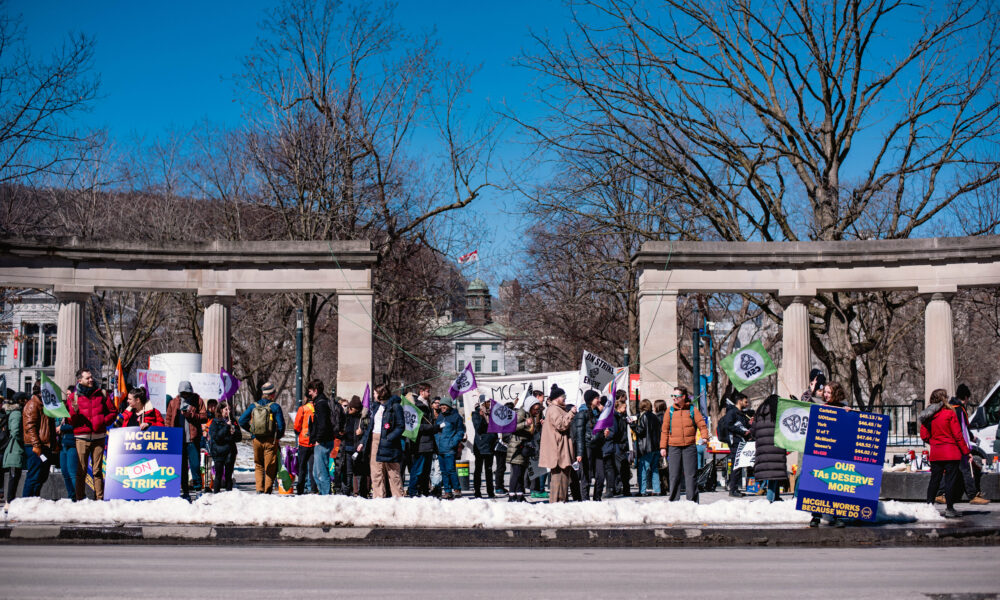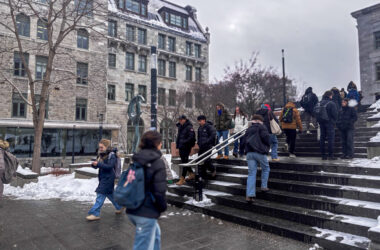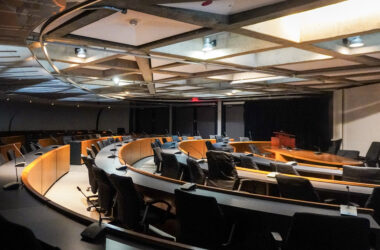Students walking through Roddick Gates on Monday, March 25 were met with the sounds of bells, chants, and honks, as well as a massive banner that read “McGill is a union university.” This picket line marked the start of McGill Teaching Assistants’ (TAs) strike for better pay, healthcare, and indexed working hours.
The Association of Graduate Students Employed at McGill (AGSEM)—the union which represents TAs—hopes that this strike will pressure McGill to take negotiations for a new collective agreement (CA) more seriously. Since the beginning of the academic year, AGSEM has met with McGill 15 times to bargain over both monetary and non-monetary aspects of a new contract.
At an AGSEM rally on March 20, Dallas Jokic, a member of the AGSEM bargaining team, explained that TAs felt the need to go on strike because they did not feel that the university was genuinely considering their demands for fair pay.
“TAs are just really feeling the difficulty of getting by on a day-to-day basis,” Jokic said to The Tribune. “We talked to members who are having to make difficult choices like skipping meals or moving apartments. McGill is one of the top schools in Canada. It’s one of the richest schools in Canada. We know that they have the money to pay us fairly.”
On campus, AGSEM has been putting up posters to raise awareness about the fact that TAs at McGill are paid $33.03 per hour, while TAs at other Canadian universities tend to make $40 to $50 per hour.
AGSEM’s monetary proposal, which was submitted on Dec. 18, proposed a 40 per cent raise to bring their wages in line with those offered at other post-secondary institutions. The proposal also asked for cost of living adjustments, indexing working hours to class sizes, and healthcare benefits. When AGSEM and McGill convened on Jan. 30, McGill rejected the proposal but was unprepared to make an offer of their own.
In subsequent bargaining meetings, McGill submitted a counterproposal and offered a pay raise of 1.25 per cent the first year and 1 per cent in subsequent years, and then increased their offer to 2.25 per cent the first year and 1.25 per cent in subsequent years. Neither offer addressed cost of living adjustments, indexing, or healthcare. In the AGSEM newsletter, the bargaining and bargaining support committee argued that since McGill’s offers were not in line with the current rate of inflation, they essentially constituted a pay cut.
After passing a strike mandate during the week of March 11, AGSEM met with McGill again on March 19 to try to reach an agreement and avoid calling a strike. McGill raised their offer to a 4.25 per cent wage increase the first year, 2.25 per cent the second year, and 2 per cent in subsequent years and offered to put indexation on the agenda of the Labour Relations Committee. However, AGSEM did not feel that this was a fair offer and ultimately decided a strike was necessary.
While on strike, TAs are not allowed to do any work—meaning they cannot grade, hold office hours, run conferences, or answer emails. If TAs do work while on strike, they are violating the law. They are also not receiving pay from the university. Those who participate in strike activities can, however, get strike pay from the union.
Emma McKay, AGSEM’s mobilization officer, told The Tribune that the union is acutely aware that the lack of pay while on strike puts many TAs in a precarious position. They explained that there are a few pools of funds that AGSEM is pulling from to pay those who engage in strike activities or need emergency funds to pay their expenses.
In the absence of TAs, many have questioned who will be responsible for grading coursework. In the leadup to the strike, McGill issued a Quick Guide for Instructors Regarding Student Assessments and a Frequently Asked Questions page about the “labour dispute” with AGSEM, which states professors can take on the grading that is typically done by TAs in the event of a strike.
On Friday, March 22, after it became clear that a strike was imminent the following Monday, AGSEM’s lawyers sent a cease and desist letter to McGill. In the letter, AGSEM’s lawyers state that McGill instructors cannot legally perform the work of striking TAs and claim that the university has falsely attempted to position lecturers, instructors, and faculty as TAs’ managers to allow them to break the strike and perform scab work.
The letter reads, “It is clear that you are trying to influence the power balance in favour of the Employer by using disinformation and by sending directives meant to convince other employees to perform TA tasks, in contravention to article 109.1 of the Labour Code. Such tactics will not be tolerated.”
The McGill Association of University Teachers (MAUT)—which represents instructors—consulted Melançon Marceau Grenier Cohen, a Montreal law firm that specializes in labour law, and came to a similar conclusion a little under two weeks before the strike began. The association issued a statement to their members indicating that professors may be in violation of labour law if they grade work that is typically evaluated by TAs during a TA strike, as they have been instructed to do by many of McGill’s program directors and deans. MAUT doubled down on this position on March 25, giving their members advice on how to proceed if asked to do TAs’ work.
“If an instructor is asked to take on more grading than usual, as a result of the strike, they should first ask the Dean to reconsider in light of section 109.1 of the Quebec Labour Code. If there is no change, the instructor may challenge [e]mployer direction to do more grading than normal by filing an application under section 109.1 of the Quebec Labour Code as soon as possible,” the statement reads.
Renee Sieber, a McGill professor and the 2022-2023 MAUT president, explained that the administration has been closely regulating what messages managers send out about the TA strike.
“We’re seeing very tight message control; that deans and chairs cannot make any modifications to these messages,” Seiber said. “It is incredibly top down.”
Seiber also stressed that the McGill administration does not seem to recognize the immense value that TAs bring to the entire McGill community.
“We’re all in a community of higher education. Our TAs work with us. They’re often also our graduate students, and we support them [….] They’re part and parcel of the intellectual engagement in this community,” Seiber said.
Anthony Voileau, U2 Science, expressed a similar sentiment, asserting that TAs have been integral to his life as a student at McGill.
“I’m a computer science student and the computer science TAs are basically how I pass my classes. I think it’s completely normal for them to be asking for more wages. They’re absolutely essential to my McGill life.”
At the picket line, McKay told The Tribune that TAs sympathize with students who are anxious about the academic repercussions of the strike. However, they noted that better working conditions for TAs would produce better learning conditions for undergraduate students in the long run.
“All of us in the union have spent a long time in academia, and we can all really empathize with the situation of undergrads here,” McKay said. “[But] we know that every time we stop the fight because it’s hard, we lose.”
McGill Director of Labour and Employee Relations Francis Desjardins issued a statement to staff and students on March 23 recognizing TAs’ right to go on strike. However, he asserted that TAs did not have the right to picket on university property.
“We expect to see picket lines on public property around the downtown campus, as is within the rights of striking employees. However, they may not picket on University grounds nor impede normal access to buildings,” Desjardins wrote.
In a statement published in February before their own strike, the Association of Law Professors Employed at McGill (AMPL) put out a statement contesting McGill’s claims that picketing on university grounds is illegal, writing that the McGill University Health Centre had been penalized in the past for prohibiting similar picketing by striking workers. AGSEM has referred to this statement to challenge McGill’s claims.
McKay told The Tribune that the union has no intention to implement any hard picketing strategies.
“Our top priorities when picketing is safety for everyone involved, and avoiding legal consequences for everyone involved. So we have absolutely no intention of doing something that would put our members at risk,” McKay said.
However, McKay noted that AGSEM would be picketing on university property and that despite Desjardins’ statement, they were legally entitled to do so.
In the afternoon that the strike began, McGill sent another university-wide message claiming that picketers had partially blocked entrances and instructing students and staff to call security if they could not gain access to buildings or had their classes disrupted.
Some, like a TA named Sebastien, who preferred to only be referred to by first name, think that McGill is using misinformation as a tactic.
“I think one of McGill’s last-ditch attempts at subverting the strike is misinformation. They’ve been spreading a fair amount of it,” Sebastien said while picketing in front of the Arts Building. “Several things that they’ve said over the past couple of weeks have just been inaccurate. We are perfectly allowed to picket on McGill University grounds, as we currently are. They’ve also completely misinformed a lot of course lecturers and faculty. Fortunately, we have huge amounts of solidarity, I think both from the student body and from professors and lecturers.”
McGill declined to comment on the CA negotiations or cease and desist letter from AGSEM. Media relations officer Frédérique Mazerolle briefly commented on the value of TAs and the impacts of the strike.
“McGill deeply values the contributions of teaching assistants and hopes for a timely end to the strike,” Mazerolle wrote. “The University is continuing its operations, prioritizing the measures necessary to ensure that students are not unduly affected by the labour action.”
AGSEM will have its next bargaining meeting with McGill on March 26.








